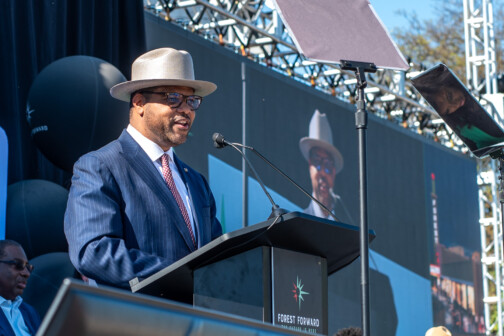The revamped touring version of Andrew Lloyd Webber’s The Phantom of the Opera is billed as a “spectacular” new approach to Broadway’s longest-running show. But instead of Phantom 2.0, really it feels more like Phantom 1.25, since some of the original elements remain intact while others—mainly what was previously most effective—are discarded in favor of busier, less impactful choices.
Like any show that has run for years on end, it’s easy to forget how revolutionary Phantom‘s original staging and design were. It’s far easier to scoff at the broadly sketched cartoon we think we remember. I revisited Phantom on Broadway in April (my ninth viewing overall), and there was something so comforting about the still-crisp execution of what could have felt like shopworn material. Perhaps that’s why this version, presented by Cameron Mackintosh and directed by Laurence Connor, feels so jarring. Instead of creating an entirely new approach, the team offers up a Frankenstein-like amalgamation of new and old that feels more like a money grab than an artistically innovative approach.
Now I’m not advocating that we leave The Phantom of the Opera as a preserved relic for all eternity. The show is nearly 30 years old, after all. Right across the street at the Wyly, Dallas Theater Center is proving that even the most beloved of musicals can handle a good shake-up. But Liesl Tommy’s uniquely modern take on Boublil and Schönberg’s warhorse Les Misérables is unlike any that has come before, boldly proclaiming itself as a true original. This “Twilight Zone” Phantom is just familiar enough to be pacifying, yet not brave enough to be memorable.
It doesn’t help that the cast, a combination of green performers and Broadway pros, doesn’t feel up to the exaggerated task of Lloyd Webber’s music and book (lyrics by Charles Hart). As the disfigured Phantom, Cooper Grodin is neither dangerous nor sexy nor pitiful. Instead, he plays the obsessed opera ghost like a petulant teenager, stomping around the stage as though he’s just been grounded. His muse, the ballerina-turned-soprano starlet Christine Daaé, is sung with far too much pop inflection by Julia Udine (the role is alternated with Grace Morgan and Celia Hottenstein).
Linda Balgord (a former Norma Desmond in Sunset Boulevard and Grizabella in Cats) curiously doesn’t convey the grim power normally inherent in the strict ballet mistress, Madame Giry. Perhaps that’s because most of her important moments—Madame Giry lives for the dramatic pause—are rushed. The same problem lies with Mssrs. Firmin and André, the overwhelmed businessmen who buy the cursed Opéra Populaire. Brad Oscar, Tony-nominated for his role as the singing Nazi Franz Liebkind in The Producers, is wasted as the befuddled manager Firmin. Edward Staudenmayer, playing it straight as André, leaves far more of a mark.
Some of Maria Björnson’s original costumes survive in this production—Christine’s ruffled white dressing gown and her voluminous, ice-blue cloak, for example—but others from the luxurious array of gowns and getups created by the late, Tony Award-winning designer are sadly substituted with less impressive versions (whimsical “Masquerade” disguises, you are sorely missed).
Björnson’s sumptuous yet simple sets, constructed mainly out of yards and yards of brocade and velvet, are here replaced with cumbersome, and often cramped, revolving sets by Paul Brown. The managers’ office, portrayed before with a desk and a strategically chosen rectangle of harsh light for the doorway, now resembles a crowded scarlet bordello. Only one moment, when the Phantom first leads Christine down to his lair via a set of magically appearing stone steps, feels aesthetically promising. That is, until you start remembering all the iconic tableaux from the original version, and then this Phantom feels like nothing more than a pale shadow of its former self.






